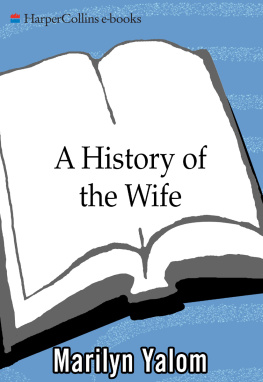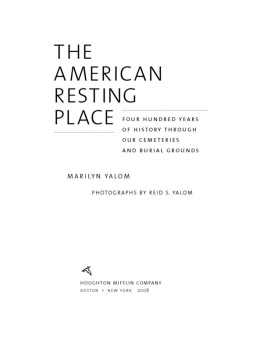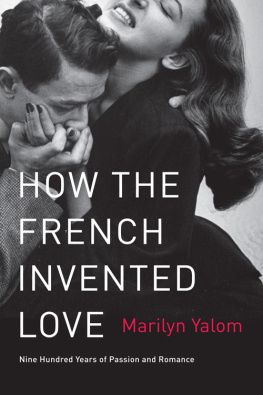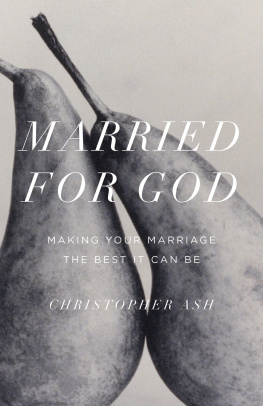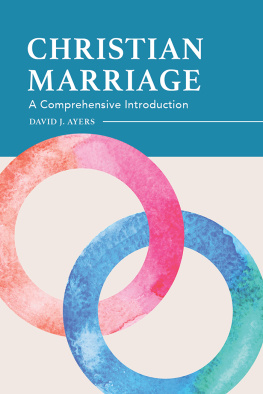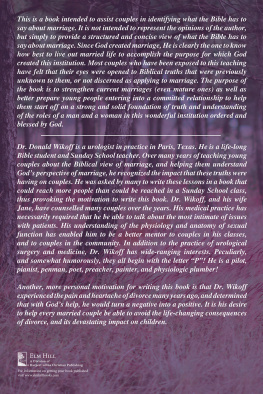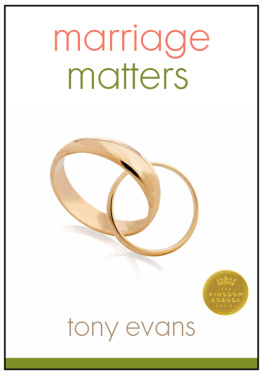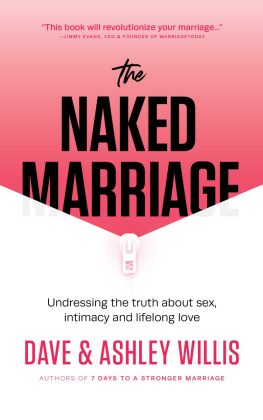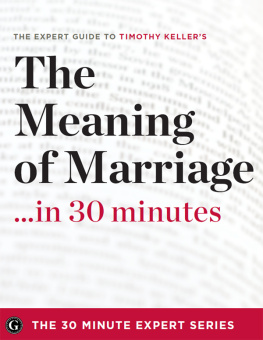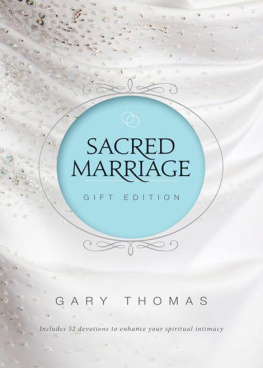A History of the Wife
Marilyn Yalom

For my girlfriendsall wives, at one time or another.
Becky, Carole, Cathy, Cynthia, Diane, Helen, Jean, Lia, Margi, Mary, Minerva, Myra, Phyllis, Stina, Sue B., Sue G., Vida
T his book could not have been written without the scholarship of hundreds, perhaps thousands, of individuals working in the fields of womens history and family history. The numerous works I cite in the endnotes represent only a part of the vast primary and secondary literature from which I have constructed A History of the Wife. Fellow and sister travelers, named and unnamed, I salute you all!
Many colleagues known to me personally have contributed mightily to this book. First and foremost, I wish to thank the scholars and staff at the Stanford Institute for Research on Women and Gender, my intellectual home for the past quarter century. Among them, I have depended heavily on the critical reading of Senior Scholar Susan Groag Bell and the unflagging support of Professor Laura Carstensen, the current Institute Director. Senior Scholars Edith Gelles and Karen Offen also offered substantial comments on the manuscript, especially on chapter 4.
Various Stanford faculty members have given me valuable advice: Professor Barbara Gelpi of the English department, Professor Jean-Marie Apostolides of the French department, and Professors Keith Baker, Aaron Rodrigue, and Paul Seaver of the History department. A special word of thanks to Myra Strober, Professor of Education, for her contributions to the last chapter and her influential presence in my professional life.
Professor Shulamith Magnus of Oberlin College provided useful comments on the biblical material and Emeritus Professor Ira Lapidus of the University of California/Berkeley, enlightened me on Muslim practices. Professor Monique Canto-Sperber, the French translator of Plato, was a critical reader of the Greco-Roman section. Professor Samuel Rosenberg of the University of Indiana commented generously on the medieval chapter. Professor William Tuttle of the University of Kansas was similarly helpful concerning World War II. Cynthia Fuchs Epstein, Distinguished Professor of Sociology at the Graduate Center, CUNY, encouraged me from the start and provided insightful observations along the way. Novelist Beth Gutcheon added considerably to my knowledge of nineteenth-century quilt making.
Margaret Pirnie and Kate Bedford were indefatigable research assistants. I benefited from their strong arms carrying piles of books to and from the library, and from their youthful reactions to the oddities of marriage throughout the ages.
I am grateful to Basic Books editor Joanne Miller, whom I have known for many years, for suggesting that I focus on the wife, rather than on the couple, as originally intended. My literary agent and friend, Sandra Dijkstra, never faltered in her enthusiasm for this project and procured good American and British publishers. Joelle Delbourgo generously supported this book during her tenure at HarperCollins, and Julia Serebrinsky magnificently carried the editorial process to completion.
As always, I counted on my husband, Irvin Yalom, Emeritus Professor of the Stanford psychiatry department, for a close reading of the text and spirited discussions when we disagreed. Married to him for forty-six years, I have come to know the plethora of meanings hidden in the little word wife.
Is the Wife an Endangered Species?
DEAR ABBY: I have been engaged to a wonderful man for more than two years and cannot seem to set a wedding date. He loves me and my 9-year-old daughter. He does all of the laundry, the dishes and the cleaning, and he accepts my daughter as his own. He works two jobs so we dont go without anything.
Sounds perfect, right?
The problem is, I dont think I love him. I say that I do, but I dont feel it. He is all a woman could ask for in a husband, but is that enough to replace love? Or have I read too many romance novels?
He wants to get married as soon as possible. I am 29, have never been married and I feel my daughter needs a father. I am also afraid I wont find a man who will ever love me as much as he does.
Can I find a man whom I love, who accepts my daughter as his ownor should I marry a man I dont love but who would be a wonderful husband and father?
FOR BETTER OR WORSE
DEAR FOR BETTER: If you marry this man, knowing in your heart that you do not love him, you will be doing yourself and him a great disservice. Marriage is supposed to last forever. And forever is a long time to live with yourself, feeling that you sold out because you were afraid you wouldnt find a man you can love. Let him go.
July 3, 1998, San Francisco Chronicle
F or most of human history, such a letter could not have been written. Not only were most women unable to write, but most had little say in the choice of their husbands. If they had sexual relations outside of marriage and especially if they had a child out of wedlock, they would have been disgraced, and even executed in some societies. In early Puritan America, those judged guilty of fornicationsexual acts between persons not married to each otherwere usually fined and publicly whipped. The stigma surrounding the unwed mother was so severe that she did everything possible, including infanticide, to keep the newborn hidden. If a single mother could not bear the thought of being parted from her baby, the only socially acceptable response was to find a husband.
Today, a single mother no longer faces the public censure of the past. She can, like the mother in this letter, reject the offer of a man eager to marry her. It is not enough for him to love her, accept a child who is not his own, work two jobs to support them, and do the laundry, dishes, and cleaning. The author of the letter is holding out for something moreshe wants to find a man she can love. And in this decision, she is supported by that popular moral arbiter, Abigail Van Buren.
Do you believe that Dear Abby gave the woman good advice? Should this mother leave a man who has taken on the roles of partner, provider, and de facto father? Is Abby correct in believing that reciprocal romantic love is the only basis for a lasting marriage?
This letter tells us a great deal about womens attitudes toward marriage at the present moment. It tells us that the single mother, no longer forced to wed, wants to be able to marry in the name of love that intoxicating mix of sex and sentiment that most adults have experienced and no one can define. Once upon a time, women married for other reasons: for economic support, to cement family alliances, to have children, to counter loneliness, to be like all the other women. Once upon a time, women wore the title wife like a badge of honor. To be a parsons wife, a bakers wife, a doctors wife told the world loudly and clearly that one had fulfilled ones natural destiny. It spoke for legitimacy and protection in a world that was proverbially unkind to spinsters. Whether one was happily married or not, the wedding ring, in and of itself, was a measure of female worth.
Today, the word wife does not convey the same unambiguous message. It no longer implies, as it once did in middle-and upper-class homes, that one will be provided for by ones husband. It is no longer the sole gateway to sexual and domestic pleasures, since nonwives and nonhusbands now live together openly as never before. It is not even the indispensable passage to motherhoodas many as 40 percent of American babies are now being born out of wedlock.
For business and professional women, wifedom today can be a mixed blessing. Some wives are able to make use of their husbands contacts; others find it expedient to underplay their conjugal status, especially in the face of colleagues and bosses who demand primary loyalty to the firm. An increasing number of married women choose to keep their maiden names. With divorce on the horizon for approximately half of all American spouses marrying today, why bother changing your name when you may have to take it back again? Why bother marrying at all when you dont need a husband to have sex, economic support, shared residence, and even children?

